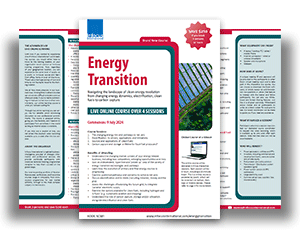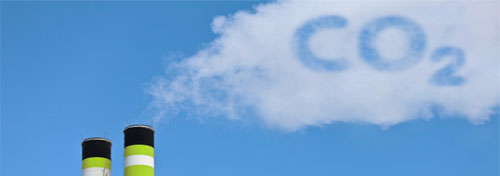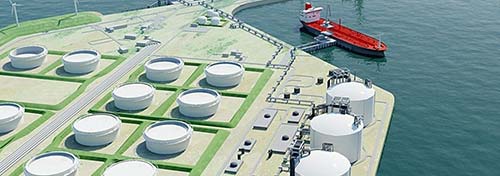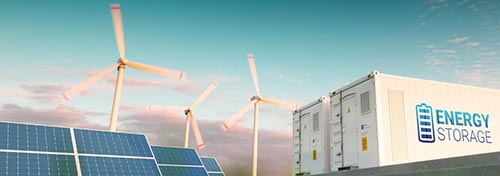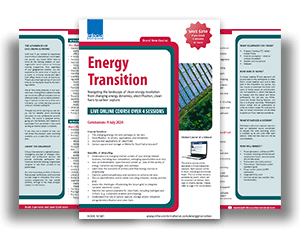Energy Transition (Online Course)
WHEN
Upon Request
WHERE
Live Online Course/
In-Person
Overview
Navigating the landscape of clean energy revolution from changing energy dynamics, electrification, clean fuels to carbon capture
This time-effective course is designed to provide business decision-makers with a comprehensive overview of the energy transition: what it means, the technological solutions which will compete and coexist, and the policy and practical factors which will determine deployment pathways.
For anyone involved in strategy, business or product development, or simply those wanting to understand the wider context in which they work, an independent and hype-free perspective on energy transition issues provides a critical framework in which to base good decisionmaking. This course provides exactly that, explaining the various strands of the energy transition picture not in isolation, but so that attendees can understand how they fit together, link and interact.
Following a review of the energy transition thus far, including current trends and rates of change, attendees will discuss the key drivers and motivations for key players from industry to policy. They will learn how processes of ‘electrification’ are central to both energy transition pathways and current energy market disruption, along with the limits to those processes. They will assess which clean fuels exist and are emerging as an alternative where direct electricity use proves impossible or uneconomic. Finally, they will understand the extent to which carbon capture, utilisation and storage may play a role in cleaning up where fossil fuels prove harder to shift – and as the solution which can put the ‘net’ into net zero.
Benefits of Attending
- Understand the changing market context of your energy-related business, including new competitors, emerging opportunities and risks
- Gain an independent, hype-free and ‘joined up’ view of the variety of energy transition technologies and pathways
- Learn how the evolution of primary and final energy sources is progressing
- Examine published pathways and scenarios to achieve net zero
- Discuss electrification and its limits (including minerals, money and the grid)
- Assess the challenges of balancing the future grid, to integrate ‘variable’ electricity supply
- Examine the options available for clean fuels, including hydrogen and ‘e-fuels’ (e.g. sustainable aviation and shipping)
- Understand the role of carbon capture, storage and/or utilisation alongside electrification and clean fuels
Live Online Course – How It Works
The structure of our virtual learning program is designed to keep the same levels of engagement and networking as our on-site public courses. Course content is delivered through our easy-to-use online learning platform and is supplemented by case studies and practical exercises.
Like our classroom-based public courses, you will have live interaction with our course facilitators and other participants. Our live online courses are led by our experienced instructors, who will provide you with easily digestible content, using knowledge learned from many years in the industry, during scheduled times. Delegates will receive copies of the course materials electronically.
This course is scheduled to take place over 4 live online sessions using virtual learning technology.
Course Agenda
Session 1
The changing energy mix and pathways to net zero
- Historic trends in emissions and the energy mix
– Examining energy mix data from BP, the International Energy Agency (IEA) and others - Decarbonisation success stories: what are the key lessons?
- Data showing regional contrasts within the global energy transition picture
– Comparing and contrasting markets including Germany, France, the US and Southeast Asia - Policy and the energy transition: key motivations, constraints and industrial strategies
- Examples of net zero scenarios and modelled pathway
– Examples including the IEA, IRENA, Shell and others - The oil & gas sector and the energy transition: business drivers, risks and opportunities
- Follow the money: investors and the energy transition
Session 2
Electrification: its drivers, applications and limitations
- The basis of electrification’s role as a core carbon reduction strategy
- The disruptive impacts of rapid cost reductions in renewable power and battery storage
– Market data for key technologies including solar PV and Li-ion battery storage - The current status and rates of change in transport and heat electrification
– Market data on electric vehicle (EV) and heat pump growth, both globally and in key markets including Europe, the US and Asia - Trends in the evolving electricity mix: how clean is electrification?
– Contrasting examples of electricity mix decarbonisation: the UK and Germany compared - A critical review of renewable vs. conventional power sources from a system resilience perspective
- Limits to electrification, including grids, power supply attributes and critical mineral resources
- The digitisation of energy (and its implications for rates of change)
- The disruptive role of aggregation and Virtual Power Plants (VPPs)
– Examples of market innovation from the US and Europe
Session 3
Sources and applications of ‘clean fuels’
- Oil & gas sector transition strategies: how can they move beyond fossil fuels?
- Pathways to hydrogen, hydrogen derivatives and ‘e-fuels’, including technology status, scale and cost considerations
– Pilot and commercial-scale project examples covering hydrogen, ammonia, methanol and e-fuels from around the world - Focus area: current and proposed solutions to decarbonising shipping
– Examples of low-carbon shipping projects in Europe and Asia - Focus area: current and proposed solutions to decarbonising aviation
– Examples including the UK’s ‘Jet Zero’ initiative, and pilot stage hydrogen-powered flights - Biofuels as an alternative to hydrogen-based fuels: what are their pros and cons, and limits to scale?
- Clean fuel blending strategies
- Policy and the development of clean fuel markets
– Example: the EU’s new mandates for clean hydrogen in industry and clean fuels in road transport, shipping and aviation
Session 4
Carbon Capture and Storage (CCS): a lifeline for fossil fuel producers?
- The current scale of the CCS market
– Examples of project data resources and a review of global market growth and trends - Carbon capture technologies: reviewing the options available
- Carbon transport and storage options and scalability challenges
– Illustrated by new project examples in Norway, the Netherlands and the US - Putting the ‘net’ in net zero: the critical role of carbon removal solutions, including BECCS and DACC
- Carbon pricing and policy: a confusing picture!
– Reviewing the global map of carbon pricing schemes and examining trends in example markets including the EU, US and China - Carbon capture and the continued use of fossil fuels: will this compete with the development of electrification and/or clean fuel pathways?
- Summary: the energy transition as a mix of coexisting low carbon solutions
Training Methodology
The course combines presented materials with lenty of opportunity for Q&A and the use of quantitative models to illustrate key learning points. Current market examples and data are utilised wherever helpful.

Pre-Course Questionnaire
We would like to customise the workshop based on your specific needs. Pre-Course Questionnaire will be sent prior to the workshop for analyse in advance and to be addressed during the course.

Course Certificate
Upon the successful completion of this course, you will receive a Certificate of Completion bearing the signatures from both the Course Director and the Course Organiser. This Certificate will testify your endeavour and serve towards your professional advancement.
Who Will Attend
- Oil & Gas
- Power generators, utilities and IPPs
- Petrochemical and process industry
- Government and policy makers
- Project developers and sponsors
- Development finance institutions and commercial lenders
- Sustainability / ESG / Environment advisors
- Investors, including commercial and development banks, venture capital and private equity
- EPC contractors
- Commercial services suppliers (law, consultancy, insurance etc.)
You Might Also Be Interested In
Carbon Capture, Utilisation & Storage (CCUS) (Online Course)
Master the technology pathways, its business drivers, economics and deployment strategies
Option 1: 13, 18, 19, 20 March 2025
Option 2: 10, 12, 13, 14 November 2025
LNG: Supply, Demand, Pricing and Trading (Online Course)
An overview of the LNG business in 2025 – 2050 with a commercial focus but technology and shipping will also be covered
Option 1: 18, 20, 24, 25, 26, 27 March 2025
Option 2: 9, 10, 11, 15, 17, 18 September
Energy Storage (Online Course)
A business-focused assessment of energy storage opportunities, competing solutions and project delivery essentials
Option 1: 16, 17, 18, 20 June 2025
Option 2: 17, 18, 19, 20 November 2025
Green Hydrogen Projects, Economics & Finance (Online Course)
Developing green hydrogen projects by seamlessly integrating core technological and economic elements
Dates: 26, 28 August, 2, 3, 4 September 2025
Mastering Clean Ammonia (Online Course)
A business guide to ammonia production, market opportunities & deployment challenges
Dates: 14, 15, 16 October 2025
Mastering Solar Power (Online Course)
Building solar power into clean, modern & flexible power systems




